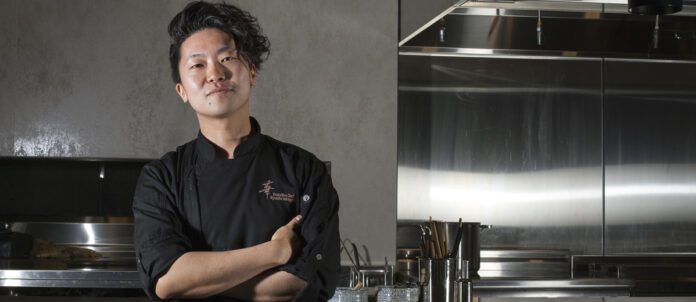When Ryusuke Nakagawa set out to create the intimate Michelin-starred Aburi Hana restaurant, nestled in the Yorkville area of Toronto, his guiding mission was to meld tradition and evolution.
“Japanese cuisine has a long history and the culture is wonderful. I learned that in Japan and cherish it. Therefore, when I develop a menu, it’s important to protect the culture and rules of Japanese cuisine created by our predecessors and pass them on.”
The intimate restaurant features 12 counter seats and five private rooms seating anywhere from two to six people in each room, offering up a menu that is inspired by the seasons, and artfully presented. Many of his dishes incorporate flame searing (the restaurant’s name actually translates as flame searing).
Nakagawa is fiercely committed to preserving the historical context of his native cuisine. “There’s always room for individual expression.” But he’s cognizant of the need to “adapt values for food culture, ingredients, and restaurants. Instead of seeing them negatively, challenge and evolve. Protect tradition, create new values and evolve. This is what I value most as a chef.”
Nakagawa was grounded in traditional “Kaiseki cuisine” when he studied under various master chefs in Kyoto, Japan. “All the dishes I make come from this traditional Japanese dish.”
After studying French and modern gastronomic cuisine for a while, he moved to Canada, intent on promoting awareness of his native land’s cuisine.
Though his practises are grounded in Japanese tradition, now that’s he’s helming the kitchen of a restaurant in Canada, he’s committed to local sourcing and sustainable practices.
“Although it’s been the industry standard for fine-dining restaurants to fly in ingredients from around the world (often with prestige attached to the high cost and difficulty to obtain these items), as environmental concerns grow larger by the day, I increasingly feel the weight of responsibility to be more sustainable.”
To that end, he creates “dishes that celebrate local fish,” which is the essence of the original cuisine. “We have recently partnered with Affinity Fish to make our sustainability goals a reality.”
Affinity Fish’s goal is to “provide Canadians with quality seafood through careful handling, minimizing animal suffering, and prioritizing sustainable fisheries from lake to fork. The local fish, which was not originally offered at high-end restaurants, has evolved with the skills of the producer and chef to create new value. If these small actions accumulate and change the world’s environment, even just a little, I will be happy.”
As one of the first restaurants in Canada to gain a Michelin Star, he’s looking forward to creating more attention and awareness to the beauty of Japanese cuisine.
“From a technical standpoint, restaurants receive stars based on merit of quality of products, mastery of flavour and techniques, personality of chef, value for money and consistency. At Aburi Hana, we embrace every aspect of this “checklist” and it’s at the foundation of everything we do. I am always searching for the highest-quality ingredients and constantly striving to make the most delicious food with an open mind, discipline and passion. When you dine at Aburi Hana, I hope you are able to experience the endless hours of recipe development and work that went into every aspect of the dish.”
With a Michelin star guiding him forward, one of his “goals is to let people around the world know more about the wonders of Japanese cuisine. Thankfully, our restaurant has gained wider recognition since receiving the Michelin star. This has been so gratifying for the entire team. In the future, I would like to use this influence to further share this cuisine that I love so much through unique collaborations with various restaurants and interesting events. It would bring me so much joy to see people sharing my love of refined Japanese cuisine.” (At time of writing, Nakagawa was set to participate in a collaboration with Daniel Hadida at Pearl Morisette in Niagara-on-the-Lake).
As for advice to those looking to enter the industry, the young chef says: “Don’t forget that you love to cook. In reality, if you become a chef, there will be many challenges and obstacles that might cast a shadow over your passion to cook. But you can’t be a great chef without this passion.” And, he adds, “Take care of the basics. If you look at great chefs, they look very glamorous, but they all have a humble foundation that makes them glamorous. Laying a modest foundation when you are a young chef will create a wonderful life as a chef.”
By Rosanna Caira


















